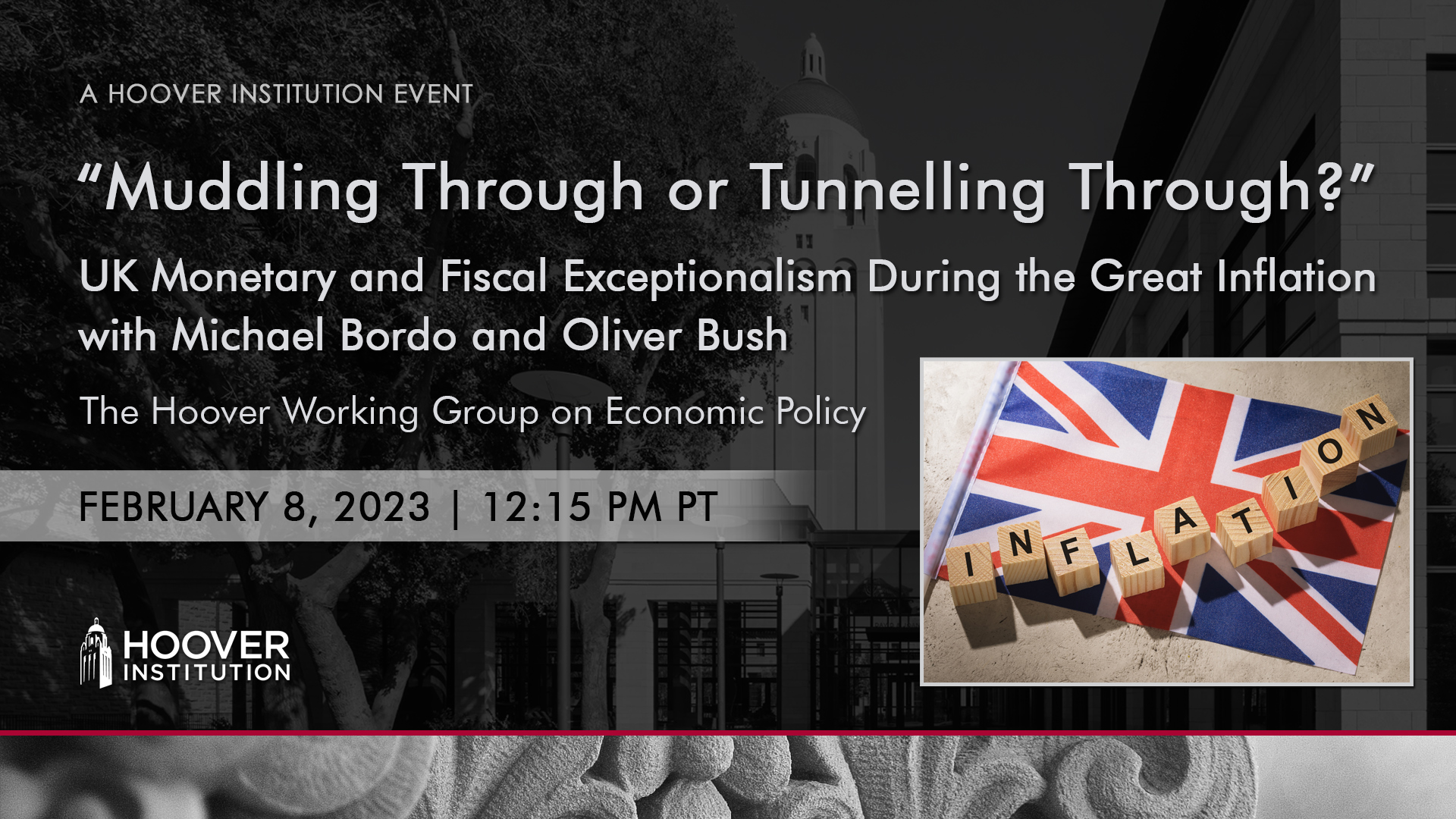PARTICIPANTS
Michael Bordo, Oliver Bush, John Taylor, Richard Anderson, Christopher Ball, David Bailey, Valentin Bolotnyy, David Brady, Luca Branco, John Cochrane, Chris Dauer, Steve Davis, Randi Dewitty, Sami Diaf, John Duca, Sebastian Edwards, Christopher Erceg, Andy Filardo, Paul Gregory, Joseph Gruber, Joseph Haubrich, Gregory Hess, Robert Hetzel, Nicholas Hope, Ken Judd, Morris Kleiner, Pete Klenow, Donald Koch, Evan Koenig, Roman Kräussl, Jeff Lacker, Mickey Levy, John Lipsky, Michael Melvin, Alex Merk, Elke Muchlinski, David Papell, Elena Pastorino, Paul Peterson, Ned Prescott, Laust Særkjær, Lawrence Schembri, Pierre Siklos, Christine Strong, Jack Tatom, George Tavlas, James Van Horne
ISSUES DISCUSSED
Michael Bordo, Ilene and Morton Harris Distinguished Visiting Fellow at the Hoover Institution, Board of Governors Professor of Economics and director of the Center for Monetary and Financial History at Rutgers University, and Oliver Bush, senior economist at the Bank of England, discussed “‘Muddling Through or Tunnelling Through?’ UK Monetary and Fiscal Exceptionalism During the Great Inflation,” a paper with Ryland Thomas (Bank of England).
John Taylor, the Mary and Robert Raymond Professor of Economics at Stanford University and the George P. Shultz Senior Fellow in Economics at the Hoover Institution, was the moderator.
To read the paper, click here
To read the slides for Michael Bordo, click here
To read the slides for Oliver Bush, click here
WATCH THE SEMINAR
Topic: “Muddling Through or Tunnelling Through?” UK Monetary and Fiscal Exceptionalism During the Great Inflation
Start Time: February 8, 2023, 12:15 PM PT
>> John: Okay, well, welcome everybody. Those of you who are away and those of you are here, we're really very happy to have Mike Bordo be back here and Oliver Bush be not here, but almost here. And Ryland Thomas is here in absentia, yeah, it feels great, this is a great topic.
I would just mention next week Ellen McGrattan will be visiting and talking from the University of Minnesota. And don't forget our May 12 conference, which is coming up fast, which we're still putting things together again. But anyway, today we're very happy to have Mike Bordo and Oliver Bush.
I guess the title is muddling through or tunneling through, UK monetary and fiscal exceptionalism during the great inflation. So thank you very much, Michael and Oliver.
>> Michael: Well, thanks, John, it's great to be back here in this room. The last time I was here, I think it's four years ago, and Ned Prescott and I gave our paper and George Shultz was here, so it's four years.
This is a project I've been doing with Ryland Thomas and Oliver Bush at the Bank of England. It's been going on for about four or five years. We have a very long paper which we've put up, and it'll probably end up being a monograph. And I don't know when that'll be done and there will probably be articles coming out of it.
In fact, the idea for this goes way back to the great inflation conference that Athanasios and I did in Vermont in 2008. And John Taylor was there with Andy Levin. And there was a paper on the Bank of England, which was a great paper, but I always felt that there's a lot more that we could learn about it.
And so listening to John Cochran over the years, I think the fiscal side is important and we're gonna talk about this. Ryland Thomas, who is really the expert here on the history of that period and written a ton of stuff, a key guy at the Bank of England, he couldn't make it.
So it's gonna be Oli and me, and I hope we can cover the grounds. The plan is I'm gonna talk for about 15 minutes or so, and then Oli's gonna just take over. I'm gonna do the narrative, gonna tell the story. And Oli's he's got some analytics to discuss related to modern theories of fiscal policy.
So history can be a useful guide to today's episode of high inflation and the experience of the UK in the 1960s. And so really was one of the worst of all the advanced countries, the only country that was about as bad was Italy. And if we can understand its complexities, it might have some value to the policymakers of today.
And the experience of the great inflation in the UK was quite different from that in the United States. And what we wanna get at is, in a sense, one of the themes is why was the UK experience so different? And also what seems to be a good part of the story is fiscal policy.
Fiscal policy as well as monetary policy seem to be the causes. And also we have this term, UK fiscal exceptional. It could be that some of the pretty strange fiscal arrangements that they had, I mean, I'm a Canadian, so I can say that, okay, may have something to do with that.
And that then leads to the third question, what ends periods of high but moderate inflation? And that's relevant to right now, and does it normally require fiscal consolidation? And then how do the old theories and new fiscal theories of inflation might fit into this? And also we look at inflation expectations and does that depend on the combined fiscal and monetary regime?
So here are some quotes from some people that, some of whom we know about that period. David Laidler, who's given us a lot of help on this paper, he kind of shows that the fiscal story is a lot behind some of the monetary things that happen. Douglas Wass, he was a senior policymaker and he basically says, we ran deficits, but it really didn't matter.
And last we've got Tom Sargent and talks about the importance of controlling the deficit to get monetary restraint. So this is a picture that shows the UK versus the US and the other G7 countries. Up to about the end of the 60s, that all the lines come together.
But notice that it's in the 70s you see, the UK's experience is worse, really quite a bit worse. And so we're gonna try to get at that, what's going on. Another thing in this figure is there are four prominent peaks of double digit inflation in the 70s and 80s.
And again, the situation isn't quite the same in the states, while there is some residents, so we're gonna try to get at that. The UK experience had this kind of rollercoaster pattern. Okay, there are two measures of inflation, one is the one they used back then called the RPI, retail price inflation.
And the other one is taking modern data and pushing it back. And so again, you get these peaks, inflation goes up quickly, but it falls down, okay? And so this slide is just a very fast overview of what those peaks, those peaks were.
>> John: Mike, sorry for interrupting, can you go back two slides to the UK, the US, and the G7?
>> Michael: Yeah.
>> John: One back, yeah this one.
>> Michael: Okay, hey, Sebastian, I really wanna get through this, okay?
>> Michael: Yeah, all right, okay, but you can see the blue line is the UK. Okay, so the story in a nutshell, which I'm gonna emphasize a bit more in the next ten minutes or so, is what happened in each of these peaks.
Right, so, the first period, the 60s, up to 71, inflation goes from 2 to 10%. The story is stop-go policy, just like we had in this country, and I'll go into the details of that. Plus, we've got Bretton Woods is on, and the US is running high inflation and the UK and other Europeans are importing it.
And at the same time, you've got serious problems on the supply side, declining TFP of growth, and you've got serious wage issues that I'm gonna talk about with the labor unions. And then the second period is the worst, this is 71 to 73, it's a go-stop policy. Okay, what happens Happens is that at the end of the 60s, the UK, just like the US, follows tight money and fiscal to deal with inflation.
But then unemployment goes up and the conservative party, okay, with Barbour, who was the chancellor exchange, they completely reversed the tight policy and they follow a very expansionary policy called the barber boom. At the same time, Bretton woods collapses, there's no constraint on the balance of payments. The pound depreciates, they introduce major financial reforms.
They open up the cartel of the banking system and you get the non banks and you get a growth in financial intermediation and there's a credit explosion and there's a banking crisis. And then at the end of that, they come up with a scheme called the corset, which is a restrictive scheme to slow the growth of bank credit.
Okay, then the third phase is the supply shocks and inflation goes up from ten to 25%. And here the main story is, aside from a combination of oil price shocks, is the unions and incomes policy. And it's a very perverse loop that I'm gonna talk about. And at the same time you've got really loose monetary policy.
So real interest rates are negative and all of this leads to a big crisis., okay? They're off Bretton woods, inflation's taking off, they have a currency crash in 76 and they also have trouble funding their debt. They call in the IMF and the BIs, just like Argentina, the whole team comes in at night.
Major fiscal reforms are put in, at the same time they also come up with a reform on wage bargaining. And inflation drops, but it comes back because you've got this collapse in sterling. The last one is the OPEC shock, second OPEC shock, all of the labor reforms they put in collapse.
There's something called the winter of discontent in 1978, with lots of strikes. Thatcher comes in, they follow tight monetary policy and fiscal policy is cut back, and Thatcher breaks the public union. So that's the big overview of what's going on. And the key takeaways from this is that the interaction between monetary, fiscal and financial policy had really important implications for inflation expectations, for prices in financial markets and wage determination.
And the fact that there are these large fiscal and current account deficits and double digit inflation suggests are really major policy favors. Fiscal policy was the key instrument used to manage aggregate demand before 1976. The bank of England was not independent and it was fiscal policy as much as monetary policy that appears important in both the run up and the ending of the great inflation.
They had three major consolidations that we'll talk about. And what happened is you get these large, unexpected budget deficits, they come out of subsidizing energy price increases. There are large public sector wage settlements, and the government sets its plans in volume terms, in real terms. And a lot of the deficits are funded by the banking system, so the banking system is part of the monetary expansion.
The financial markets thought that the deficits were unsustainable and they understood this faster money growth would lead to inflation. And that's what led to the IMF crisis. So there's evidence that fiscal policy was more active monetary policy, more passive than they are today. And that resonates with modern fiscal theories of inflation, like John's work and leaper and Sargent and Wallace.
Okay, so there are key hypotheses for the UK, just like for the US, bad policy, the stop go policies, monetary neglect, the cost push story, and an over expansion over accommodative fiscal. Also there's bad luck, they have declining, they have big problems on the supply side, declining terms of trade, slower TFP growth than all their trading partners.
Bretton woods collapses, UK loses its nominal anchor, their commodity price shocks in the 70s, and then the unions and the wage push shocks. All these things are part of the mix. And so looking at the bad policy, and again, I'm probably going too slowly on this. But so the key thing is there was this consensus amongst both parties in the UK that they did not wanna have anything like the great depression again.
That they really had to maintain full employment, and that fiscal policy was the way to go. And both parties believed in this. But different from the states was this underlying theory that you could use fiscal policy not just to stimulate aggregate demand, but to achieve faster potential output growth.
And that's based on theories put together by Nicholas Kaldor and Harroden, which argued that if you follow expansionary fiscal policy, you can stimulate investment. And the increase in investment is gonna feed through like a Harrod Domar growth model and give you faster growth. And the government bought this story.
So in a sense it's a misguided story that fiscal policy could achieve faster growth, at the same time monetary policy is downgraded. There's the Radcliffe report in 1959 that says, money doesn't matter, we're in a liquidity trap, a very simple Keynesian story. It suggests putting direct controls on credit, liquidity controls, rather than using interest rates and normal tools of monetary policy.
Monetary policy accommodates fiscal. The bank follows policies which are really quite similar to even keel in the states. In other words, the policies to keep rates low to fund bonds. It worked through the discount houses and the commercial banks. And before 1971, Bretton woods meant that you'd have a go phase, but then you'd run into a balance of payments crisis, and then the IMF would come in, etc.
We would lend the money to the US and they would cut back. Bretton woods breaks down, there's no, nothing, there's no constraint, policies to boost growth leads to inflation and depreciation. And this slide shows you the absolute worst of it all. So this is the Barber Boom of 1972, they follow extremely expansionary policies.
Tax cuts, expansion of public sector borrowing is gonna raise GDP growth by 10% over two years, that was the target. He says that he doesn't think it's gonna matter for inflation. Real GDP growth peaks at 7%, inflation shoots up. There's a credit boom, there's a housing boom and a big bus and a crisis, okay.
And so here you can see on this slide, you see that monetary policy's expansion are in the 70s. You've got this thing called competition and credit control, which is a decatalyzation of the banking system that leads to a money and credit boom, there's no Bretton Woods constraint. And you see that money growth peaks two years ahead of inflation.
Interesting thing is that it works up until the end of the 70s, and then there's a disconnect. That reflects the fact that the bank had imposed something called the corset in 1973, some non-market restriction on bank lending. They took it off, so there's financial intermediation, but meanwhile the bank is maintaining high interest rates and public sector deficits are following.
So that's why you get that disconnect. Real interest rates are negative and they're well below the Taylor rule, okay? Now you got incomes policy. So the basic belief was inflation is non-monetary, it's caused by cost push, okay? That's the belief that most people have. The monetarists are around and they get louder and louder, but they aren't listening to them.
So they put in these income policies, but what happens is, just like the states, their impacts are temporary, then they break down, inflation shoots up. Meanwhile, productivity is slowing, and you've got higher unit labor costs, and there's wage resistance by the unions. So the spikes in wages lead to boosts in inflation, okay?
And this slide tells you, summarizes, a lot of stuff in our paper about the labor market, which I took a lot of time to figure out what was going on, but basically, they had a report which said, listen, we have to reform labor relationships. But you've got this go-stop policy.
Excess demand, rising inflation in the 60s into the 70s becomes expected. The unions push to preserve their real wages, okay? Declining TFP growth and a rising natural rate, again, are sources of wage resistance. So the incomes policies, they break down, you get catch up wage inflation. Another special twist for the Brits is the public sector unions are becoming more and more important.
And they bargain, they hold up the economy, and with the famous coal miners strike in 1972, government caves in, just raises their salary, pays for it directly, okay, from the fiscal deficit. That spills over to the private sector and their union, they have these craft unions. So you have an industry with maybe five unions, and they have these wildcat strikes, okay, so they catch up.
So then what happens is the government subsidizes everybody. They put subsidies on rent, on food costs, the deficit gets bigger, monetary policy accommodates. So that, I think, is the bad look. And then you've got commodity prices, so you've got the supply shocks, just like in the US. Again, totally accommodated by fiscal and then monetary policy, and we describe that in the paper.
And so things are just really terrible, how did it end? I'm just gonna go through this quickly. So eventually, things get so bad, the IMF crisis is a huge wake up call for them. And here is this James Callaghan's Labor Party, okay, chancellor of the exchequer. He says, look, we can't do this anymore, we have to cut back, okay, on fiscal.
And they reject the Keynesian consensus. The monetarists are making a lot of noise at this time. Milton is advising them, Carl Bruner is there, Alan Meltzer. And so they're always talking about him, but now they're starting to listen. So fiscal policy is no longer used for demand management.
They introduce monetary targets, and they introduce nominal limits on public spending. And previously, that had been set in real terms. And there is progress in that period that follows that, okay? Then the last sort of thing I'm gonna talk about is 1981, and what happens is the unions are still chugging the log in the 70s.
They come up with a social contract, which is kind of a non-binding agreement between the unions and the government. But it breaks down, and then there's a huge period called the Winter of the Discontent in 78 and widespread strikes. Margaret Thatcher comes in, okay, they imposed a medium term financial strategy, which is to have monetary gradually declining money growth, and reduce public sector borrowing.
They exceed the monetary targets. And the chancellor of the exchequer, Jeffrey Howe, in the midst of a recession, tightens fiscal policy to bring the medium term financial strategy back. And Thatcher clamps down on the union. So this is sort of the end of it. The last thing I'm gonna say is we have a story, and maybe that can explain what's going through the political economy.
There are two possible narratives. One is, that they were muddling through, which is a term the Brits use a lot, that they were learning how to operate in a world where the nominal anchor of the Bretton Woods had ended. They went through trying a whole lot of different things.
They distrusted monetary theory, made lots of mistakes, but eventually, they figured things out, and they ended up with inflation targeting in the 90s. The second variant is called tunneling through. And here's an argument where in a sense, we say that by the 70s, they know that North Sea oil is coming, they know there's gonna be a solution to this problem.
And so they start to figure out how to get there. And so that they understood the need for monetary discipline and for having a controlled fiscal regime, and they knew the benefits of supply side reform. But there's a lot of fighting to get to that point. So I'm gonna stop here, I'm gonna shift gears, and Oli is gonna take over.
>> John: Now the point about North Sea oil was that a big enough pile of money to actually be important for this planning?
>> Michael: They thought so.
>> John: They thought so when the price of oil was very high?
>> Michael: Correct, well, they thought, this is gonna solve all of our problems, so we can just chug along.
>> John: No, you talked about the oil price shock, 78 to 85. Now the shock was 78, 79, 80, then there is a plunge, by 85, oil was cheap again.
>> Michael: Right, but they didn't know that.
>> John: No, they're okay.
>> Michael: Counting on oil is dangerous.
>> Speaker 4: Mike, isn't your view that the fall of the Keynesian consensus, In the late 70s a little premature because I think there were some selective voices that were being heard in the monetarist perspective.
Wasn't there a famous manifesto in 1983 signed by something like 300 UK economists that objected to the Titan policy?
>> Michael: Yes.
>> Speaker 4: So I think what happened was that gradually with the success of Thatcher's policies, parts of the profession began to be more converted to the non Keynesian view.
>> Michael: Yeah.
>> John: Could you, Andy has hand raised, we can't see him now, just to be sure.
>> Michael: Hey Andy.
>> Andy: Hi Mike, I'd like to commend you and Oliver and Ryland on a great paper and I just want to understand the fiscal point that you're making. Because I was reading the paper and I got to chart 2.11 which is the public sector net debt.
And throughout the 70s and 80s the debt as a share of GDP kept falling. And I was just wondering how you square this with the more modern theories of the fiscal theory versus a more standard approach which Larry Summers used last year to explain why inflation was gonna take off with the Biden fiscal policy.
And it's consistent with the way a simple ISLM story of short term fiscal policy driving inflation rather than some fiscal theory story. So I was wondering how you think about this?
>> Michael: What I'm gonna do is I'm gonna punt on this because Oli has got some slides and he's gonna go through these things, okay?
So let's hold off on that because I don't wanna answer that question now, okay? So can we change gears?
>> John: All right.
>> Dolly: Can I answer that question conceptually?
>> Michael: Yeah.
>> Dolly: So the central difference between Keynesianism is it's a flow version of the world. Today's deficit is today's stimulus aggregate demand.
Fiscal theory is generally intertemporal in a stock world debt relative to expectations of ability to pay back that debt is what drives inflation. So thats intertemporal and todays deficit can be up, down or sideways, its about the long run thing. That's why what I'm so interested by what you're saying is actually the importance of micro supply side growth and everything.
As you start growing you're gonna pay off your debts nice and easy. One thing you didn't, you mentioned a little bit, but all of these ups and downs seem to, you called labor unions a bad luck. No, labor unions are shooting yourself in the foot and because of the, you know, the micro, the growth and that's how you pay off debt.
>> Michael: Right, no I, I think, I do wanna switch Dolly, but I think that the part of this project which I learned from from Ryland, who really went through. And if you read the paper, there's a lot in there on labor, I really thought that was the heart of the problem, negative feedback loop, okay, and it isn't totally shooting off each toe one at a time, okay?
And that finally, I think Thatcher comes in and says, okay, that's it, you guys, you're fired.
>> Dolly: Okay, so-.
>> Michael: Actually, why don't we just let's hear Oli.
>> Dolly: Okay.
>> Michael: Just a second, sorry, and then you can ask, okay, sorry, Oli?
>> Olive: Okay, thank you and good afternoon, everyone.
Can you all hear me and see the slides, okay?
>> John: Yes.
>> Olive: Okay, thank you, all right, so as you heard, Mike's narrative suggests that bad policy played an important role in the British great inflation and fiscal policy was very much seen as part of the problem. So I'm gonna delve into the data, both quantitative and qualitative, to examine the role of fiscal policy more closely, both as a source of shocks and a propagator of shocks.
So first, I'm gonna show a couple more motivating slides suggesting that inflation expectations correlate with news on the monetary and fiscal policy mix. Then I'm gonna examine how closely narrative evidence and empirical impulse response functions match up to a simple model in which fiscal policy is dominant. This work is, despite this project having me start a while ago, this part is very new, so we'd be particularly keen to have your suggestions on how to improve it.
And before I go on, I should make very clear that what follows does not necessarily reflect the views of the bank of England. Okay, so in the paper, you'll see we estimated SVAR over a long sample, covering both the great moderation as well as the great inflation, this really is a diagnostic tool.
So we're unlikely to be able to recover structural shocks as the SVAR doesn't allow for structural change, which undoubtedly happened over this sample of the long run. Long run TFP and core inflation might be somewhat more credible than the others. But the thing I really wanna draw your attention to in this chart, in this shop, decomposition, is that the contribution from core inflation shocks.
So that's like the long run component of inflation, was rising well ahead of the oil price shocks and falling in the early 1980s.
>> Olive: This slide shows household inflation expectations, which follow broadly, a similar pattern, so rising well ahead. In fact, you don't even see them jumping up at the time of the oil price shocks.
And in empirical exercise, in the paper, we confirm that they are nothing Granger caused by inflation surprises. That rather begs the question, well, what is shifting these inflation expectations? And at least on the face of it, the shifts in this inflation expectations series appear to correlate reasonably closely to big news on the monetary fiscal policy mix.
Devaluation in 67, sterling floating and the barber boom budget, the Callahan speech, which Mike quoted from in 77. And then the Jeffrey Howe budget, to which you had this letter with the 300 economists, which was in 1981, which signaled a big change in the conduct of monitoring fiscal policy.
>> John: Can you define what the data is when you say household expectations?
>> Olive: Yeah, and I also noticed that I've written expectations. So this is basically survey evidence, which some economists, a while ago, the citations in the paper called Bachelor of law converted into a quantum measure. So if I remember correctly, it's a Gallup poll that was conducted regularly of ordinary households, and they were asked, do you expect inflation to rise or fall?
Rise a lot or fall a lot, and they convert it into a quantum series. So it's got some health warnings around it, but many of these household series do. Okay, so guess the question is, well, how might fiscal policy be related to inflation expectations? Well, models with fiscal dominance give one answer, this here you can see is the government debt valuation equation, made famous by someone amongst you.
Which shows that the real value of government debt is equal to the present discounted value of real primary surpluses. So really this is just an identity, but a really, really simple, an ad hoc model might give some intuition as to the potential role of fiscal policy in the British great inflation.
So just imagine, we're super ad hoc assumptions, imagine the surplus to income ratio doesn't respond to debt. So that's the kind of key assumption for the fiscal dominance regime. And let's also very ad hoc assume that the discount factor is exogenous and then anything that moves the surface to income ratio in one direction but not the other in subsequent periods and leaves output unchanged.
Or anything that moves output in one direction but not the other in subsequent periods and leaves the surplus to income ratio unchanged. Changes the right hand side of the equation and therefore changes the price level, because debt is a state where it's inherited from previous period. So that's basically the kind of super, super simple ad hoc theoretical lens through which we're gonna try and use to interpret some of what happened in the British great inflation.
So before we look at any more data and look at a more sophisticated theoretical or empirical model, the historical narrative can come in useful here. And that it might shed light on the critical assumption here that the surface to income ratio didn't respond to debt. So it might also shed light on the monetary counterpart to that assumption, which assumes a stable nominal equilibrium in these models, that the interest rate does not respond aggressively to inflation.
And finally, it offers a useful sense check on any model which relies on people understanding that there is a link between fiscal policy and inflation. Okay, so let's look at the first those questions, so did fiscal policy respond to debt? Well, it's very well known that the famous treasury view on fiscal policy gave way to a new consensus after the second World War.
Which held that fiscal policy should be the main tool of demand management, the Keynesian consensus. But this new objective didn't necessarily mean that debt stabilization objective, the treasury view, if you like, was put to one side. But this quote that Mike showed earlier is certainly suggestive that perhaps the debt stabilization objective, was indeed put on ice in the few decades after World War II.
So I've got a couple of charts here, the first one, this is taken from James Cloyne's work, and it shows tax changes which were motivated by demand management. So basically, fiscal announcements mainly budgets, each tax change, there'll be text explaining the rationale for each tax change. And he's gone through and just like the Romans did for the US, and tried to work out what the motivation was for each tax change.
And so this chart here shows tax changes for the purpose of demand management. And it very much confirms the received wisdom that fiscal policy in the post World War II period was used regularly for demand management, unlike in the regimes before or after. But then this is the interesting one, right, so this shows tax changes for the purpose of deficit reduction, so debt stabilization, if you like.
And it suggests, again, it looks like there were different regimes here and the debt stabilization objective was broadly put to one side in the few decades after World War II. So what I've just spoken to is not compelling, but it does show, I think, the narrative evidence is consistent with the critical assumptions in the fiscal dominance model.
So then when it comes to the monetary leg, so I've really got nothing to add over the work of Ed Nelson, who's done really a lot on the monetary history of Britain over this period. So he argues convincingly that policymakers had a non monetary view of inflation and therefore allowed monetary policy to accommodate other shocks and try to use other policies like incomes policies and credit controls instead of monetary policy.
Okay, so then another question is, well, okay, did people in the real world, as opposed to in the model in this period, actually think there was a link between fiscal policy and inflation? When news came along that affected the fiscal position, did they think that was relevant to future inflation?
Well, it turns out there was a popular theory which linked fiscal policy to inflation. It was called the credit counterparts theory, and it held that the non bank sector of the economy could only absorb so many guilts. Beyond that, government deficits would be funded by the banking system and that in turn would be associated with an expansion in broad money which would lead to inflation.
Now this isn't a modern theory, but policymakers and financial market participants at the time were using it. And when we looked at the really big movements in long term forward rates in the 1970s, changes inflation risk premium, we found that they often occurred on days with fiscal news.
So far, so consistent with the simple fiscal dominance model, but what about the response of the economy to shocks? Well, the narrative evidence Mike presented suggested a possible role for at least three shocks, fiscal shocks, although I should say there's no counterpart the Vietnam War or the Great Society in the UK.
Commodity shocks, oil most notably, and productivity shocks, might touch on the product of. So take the first of these, so surprise tax cut, again in the government debt valuation equation, will reduce the primary surplus to income ratio and absent any changes in output of the discount factor. Or an increase in future primary surpluses to income ratios will raise the price level.
Okay, so just let's test that intuition in a slightly less simple model. So what I've done is I've taken the Blanchard Gali 2007 oil paper and then augmented it with a very, very simple. And as before, I've assumed that the surplus to income ratio does not respond to debt to income ratio.
I've assumed that it does respond to the relative price of oil, and I'll talk more about that later. It's not relevant for this particular thought experiment. And we've also assumed that the nominal policy rate is pegged. That's a stark assumption, but a simple one, okay? So what you can see here, is that a surprise tax cut reduces the primary surplus.
Yeah, as you'd expect, the real short rate falls, and there's a permanent increase in the price level. Okay, so question is, do the empirically estimated RFs kind of broadly fit with the predictions of this simple model? So to find an empirical counterpart to this, we use James Cloyne's narrative shock series.
So this uses broadly the same approach as the Roma Roman narrative tax shocks, with which you may be familiar. And so then, when you re-estimate the reaction to this shock in the great inflation sample. And as you can see here, the prime and surplus to income ratio fell, and at least within the time horizon shown here, and I've looked at longer horizons do, did not become positive.
So that's broadly, qualitatively consistent with the predictions of the model, okay? So now the response to the real short rate, you see broadly the same story, the real short rate, albeit there's some problems, and we haven't yet. And then finally, the price level rose significantly and very persistently, albeit with a much longer lag that you don't get in the theoretical school model.
So qualitatively, at least, if not certainly not quantibly, the estimated effects of tax shocks are broadly consistent with the predictions of the simple model with fiscal dominance. Okay, so let's go back to the government debt valuation equation. And Mike talked about the pressure that oil price shocks put on the public finances.
So this is an example of a non fiscal shock, which could nevertheless lead to, even if it's a temporary shock. Could lead to a permanent increase in the price level via the endogenous reaction of fiscal policy. So essentially, if the relative price of oil rises, the government responds by subsidizing like crazy and increasing public sector wages and runs a temporary deficit.
But then doesn't run surpluses in future periods, and everything else is unchanged in this simple equation, then you'll get an increase in the price level, okay? So to capture this in the Blanchard Gali model, we assume that the government responds to a surprise increase in the relative price of oil by reducing the primary surplus to income ratio.
Then the response looks pretty similar to that for the fiscal shock. The primary surplus to income ratio falls, the real rate falls, and there's a permanent increase in the price level.
>> Olive: Now for the empirical counterpart, we use shock to non oil commodities. And the reason for that is that, for half of the sample, the normal price of oil is like constant.
And then there's more volatility, but it's really dominated by two huge chunks. And so that kind of makes life a bit tricky when it comes to the econometrics. But by contrast, there's a lot more continuous variation in non oil commodity prices and they actually start to rise rapidly, well ahead of the first oil price shock.
So the downside to this approach is there's no nice off the shelf shock series. Also we have to estimate our own and we do that using sign restrictions on high frequency data. Okay, so in response to the commodity price, the primary surplus to income ratio fell, prices, the short rate fell.
And then prices rise, although it's less clear that the increase is very persistent for this, for the normal commodity price. But again then I think taking a kind of a generous view, you might think that the empirical IR's are broadly consistent, broadly comparable with the predictions of the theoretical model.
Now it would be great to do this exercise with productivity shocks too. But so far our work hasn't yielded a shock series for the UK that we consider credible. But we'll carry on that one because the productivity slowdown was probably important part of the story. And of course, like a complete account, historical account would also contain a historical shop doc shop decomposition.
Which show that these shocks that we point to, not only do they have responses that broadly consistent with the theoretical model. But also that they can account for a decent portion of the rise in fuel inflation. And we have something that's very preliminary, too preliminary even to show you today, but that looks promising.
Okay, so that kind of concludes the data section and indeed concludes our presentation, so let me just summarize. Inflation moves to the double digits in the late 60s and the early 70s, considerably before the oil price shocks, as does inflation, as did inflation expectations. We presented narrative and empirical evidence consistent with a simple model with fiscal dominance.
Household inflation expectations appear less adaptive than we might expect in that they didn't respond rise in inflation outturns. And they appear to look more like a series of regime shifts linked to news on the monetary and fiscal policy mix. Then in terms of the story of getting inflation down, fiscal policy become the focus of the authorities and financial markets in the mid late 1970s and early 1980s, when it looks like the policymakers start to grasp the nettle.
And looks the narrative evidence that Mike talked through looks kind of consistent with the Sargeant argument. That shifts in the fiscal regime might be every bit as important as shifts in the monetary regime in reducing inflation. All right, thank you very much and I'm very.
>> John: Thank you, yeah, we have a holdover and then David, go ahead.
>> David: Well, to both presenters, you didn't show much about what was going on in the labor market, either unemployment or employment to population ratios. And that might be some constraints or is there slack in the labor market which would have negative effects on any of the union wage policies that is raising wages, having strikes and so on.
So just would like to have a little bit more on what was going on in the labor market with all these policies.
>> Michael: There's quite a bit in the paper on this and I cut short on the slides, but in a sense you do have these things happening.
So that we show evidence that the natural rate of unemployment is rising, TFT growth is slowing, okay? So real wages are falling, but the unions are pushing back against this. So this wage resistance to these fundamentals that's going on, okay? Then you throw in the inflation and then you've got another factor at work because inflation comes along and these guys wanna catch up.
And so then as I told the story, the public sector unions have real bargaining power. Because they can hold the whole population up and there's no garbage, there's no heat, there's nothing, and they win. And that's kind of a dynamic and then the rest of the economy catches up.
But I think that there is this real side story.
>> David: The US had incomes, policy, wage and price guidelines and control, was there anything like that going on in the UK?
>> Michael: With the part of our story is that there was a whole series of wage price controls, okay?
There's a picture in the paper and there was a slide that we showed where they had something like maybe ten more agreements and they all broke down, okay? And every single one of them broke down. What happens in the 1970s is that they stop mandating them and they work with the unions and they work out something called a social contract.
The social contract says we'll let wages rise up to 5%. I'm just giving you one example, and we won't do anything, okay? But once you hit that gap, that 5% threshold, then we let all adjustments take place. So what happens is, they come up with a set of agreements, they hit the thresholds and wages shoot up and that feeds into prices.
So what we did was minor compared to what they did, okay? In a sense, the Americans learned from them. Ed Nelson's paper at my conference with Athanasios ten years ago, 15 years ago, that's what it was all about. It was how Burns completely bought the British story that inflation was non monetary, and cost push and can only be dealt with by wage price controls, David?
>> Speaker 9: I guess as a non economist, I find it fairly interesting that this is a period in which there's real strife in England. You've got Wilson government that starts out 64, gets beaten 70, you get Heath, then the Wilson comes back in there. If you read this as a historian of political scientists, monetary policy, then the left wing and the labor beats Heath, I mean, beats Wilson, other thing.
So I guess I'm just asking, is there not some correlation between the fact that there's big shifts between labor and conservative that has nothing to do with monetary policy? I find that hard to believe.
>> Michael: I'm not sure, I think until you get-
>> Speaker 9: Possibly true, I'm not saying it's not.
>> Michael: No, it was, but my impression is that until you get Thatcher, that there isn't much difference between labor.
>> Speaker 9: So it's a wet dry piece, so the Thatcher throws out.
>> Michael: Thatcher really changes it, they have different incentives and their constituencies are different. The Tories are afraid of social revolution and the labor guys are afraid of the unions.
>> Speaker 9: There are huge disputes in both parties.
>> Michael: Yeah.
>> Speaker 9: And part of it, when you read the history of it, says part of it's about monetary policy in the economy cuz the wets and the dries heat versus Thatcher. And then the left wing forces Wilson out and puts Calligan in, I guess that, okay.
>> Michael: I mean, well, Oli, you wanna jump in on that?
>> Olive: Yeah, I mean, just to kind of expand a bit on what you said, Mike. I mean, there's this phrase, from the period predating the brain patient called bus coliseum. They kind of combined the names of a labor chancellor and the conservative chancellor, as a kinda moniker to a shorthand way of saying that basically economic policy is invariant to the party in control.
And Thatcher definitely is a dividing line. But you could still argue that the ship started to turn before Thatcher came in, right? That Callaghan quote and the speech that it's from in 1977. Even when you look at that series I showed earlier from James Cloyne's work, you can see that things start to change in terms of the motivation for tax changes as early as 1975, Thatcher only comes in 79.
I think it's more kind of a fight between economic views of the world that doesn't correlate that closely with kinda party politics. You've got a fight going within the Labor party, too, as well as in the Tory party, so, yeah.
>> Michael: Okay?
>> Speaker 9: John, okay.
>> Speaker 10: The use of the term fiscal policy, or in tax cuts in particular, is a bit loose and vague.
I remind you that the Kennedy Johnson tax cuts included investment tax credits, and greatly increased the tax depreciation. And in fact, it was that data that led to Lafron joins Creek claim that we were on the wrong side of the Laffer curve. So in case of tax cuts, the composition is extremely important.
Where I remember enjoying going to the AEI in March of 1981, I was asked to comment on the, Bush tax reform cuts, and I said that the Bush tax cuts were less pro-business than the Kennedy-Johnson tax cuts. And so, in terms of stimulus, now, of course, it is a case that Kendi and Johnson thought their economists claim that they were following Keynesian stimulus ideas.
Now in fact, we now would look back and say, no, they were doing what we call supply-side economics. But when you talk about tax changes and its impact on the deficit, it's too vague, for example, many of us have shown that you could have an increase in the tax credit that actually then improves the government's.
Basically, they can be self financing. So this loose, vague combination, particularly in the case of England, King and Fullerton had a study in the mid 80s pointing out that the average tax on capital in England was smaller than Germany and the US. However, the variance was so high that it was the variance in the tax rates that were messing up British growth.
And so when you start talking about tax cuts as part of the fiscal policy, you can't just look at the initial revenue change or flow to have any idea of what the long run impact is?
>> John: Mike, Oliver, you wanna react?
>> Olive: We can I mean, I certainly take the point, it's gonna be difficult to kind of estimate reactions I mean, I guess we could model it theoretically.
But it's gonna be difficult to kind of have empirical estimates of reaction to lots of different types of tax changes. Although, what we're showing is the reaction to the kind of average tax change. But what we can certainly do is kind of go and look through and see, well, look over the sample, do we detect any changes in the type of tax instruments used?
And I think that would be an interesting exercise, and if we found that indeed there were, then we should think seriously about, well, how we can deal with this.
>> Speaker 10: No, it's very easy to implement, to do the analysis of what happens when you change these tax cuts, that's been done many times by many people to look at impulse responses coming from investment tax credits versus other things.
So on the theory side, this is straightforward to do. Now I don't do data, so I trust that it's hard to separate out the data, but people do claim that they can separate out the impact of individual components of tax changes.
>> Michael: Thanks, Cochran John.
>> Speaker 11: So in your narrative, one of the things that I find most interesting, you mentioned Tom Sargent's unpleasant monetarist arithmetic and the ends of moderate inflation methods of Poincare and Thatcher.
And I went back to those recently, what struck me is Tom was devastatingly right on the theory and utterly wrong on the prognostication. Cuz Tom said Thatcher's gonna fail, and he said Reagan's gonna fail. Because he said, you're trying to fight this with monetary policy, but you're still running big current deficits.
Now he missed something, those current deficits were large, but they were transitory. There was something in the system, in the present value of future surpluses that everybody else saw that Tom didn't see, that convinced them that even these deficits would be paid back, and we're back onto the trend.
So that's what leads me to think, so what was it for Thatcher, what did Tom miss? And perhaps being really serious about unions was the answer. And if you wanna think about what has shifted the fiscal regime, that now, over ten to 20 years, we're gonna be able to pay back debts, it's gotta be we're back to microeconomic growth.
And the central thing for Thatcher seemed to be the unions. Reagan, 82 and 86, the top marginal rate goes from 70% to 28%, and along with the deregulation effort, we saw the economic boom. Those are my stories about what the world saw that shifted the regime, but it's interesting that Tom Sargent himself did not see them.
And that's why you can't just look at current deficits and perhaps a hint of what was going on in previous periods.
>> Michael: I mean, I'm sympathetic to that, John. I mean, I think that Thatcher was the key, and breaking the unions and all the other reforms they did made a big difference because the UK really became an advanced country again in the post-Thatcher years.
And yeah, there's a lot of pushback against Thatcher today.
>> Speaker 11: But it was not, for example, high tax austerity, back to George Harrison's one for U-19 for me, that did the trick. And there were continuing deficits, yeah.
>> Michael: I think when I was thinking about comparing the US to the UK, I think that when we talk about the US story, we all talk about Volcker, and it's Volcker that did this, and he did that.
And money growth declined, and that was it, everything was fine. In the UK case, it wasn't like that, in the UK case, it's the fiscal stuff. And they did listen to the monetarists, they did introduce money growth targeting, and they did all of that, okay? But in a sense, that wasn't the main story, it was really the fiscal side and the structural side that mattered.
>> John: So Chris, did you have your hand up, Chris?
>> Speaker 12: Sebastian?
>> Chris: I did, John, but it's been covered by the last question by and large.
>> John: Okay.
>> Chris: No thanks, it was mainly oriented towards the comparison between the US and British case. And I was wondering whether the US case, many observers might interpret that as suggesting that fiscal policy will helpful in bringing about disinflation isn't a prerequisite.
But it was very close to what John asked and what Mike just answered.
>> John: Nick?
>> Speaker 14: Yeah, cool, can I jump in here?
>> Michael: I'm sorry.
>> Speaker 14: On this point, it seems to me we have forgotten about the great bargain that was struck between Tip O'Neill and Reagan on Social Security, raising retirement age to 67.
And also the stockman forms that put some dampers on the entitlement programs. I think the long-term fiscal impact of Reagan was much more significant than is generally realized. Yes, they cut taxes in the short run, but they also showed a willingness to address things in the long term on the expenditure side that politicians very seldom address.
And that could be part of what the Reagan revolution was about.
>> Michael: Okay, so, Nick and then, Sebastian, you got a hat's full up there.
>> Speaker 15: I'd like to make an observation and then ask a very speculative question out of ignorance. The observation is that back in 1967, I was watching a BBC panel discussion and they were all eminent macroeconomists.
But at one point they were asking one of the members of the panel about the impacts of monetary policy on the British economy. And Tommy Balog, who was asked the question, said, the only way in which monetary policy affects the British economy is if you go out of your way to shatter expectations.
Otherwise, it has no impact whatsoever. So my speculative question is, after the Wilson devaluation in 67, to what extent was the willingness of the Sterling area to fund British deficit to the extent that monetary policy was too expansionary? Was there some change in the ability of Britain to run deficits after that period because of a lack of confidence in the stability of the pound?
>> Michael: I'm not sure what happened after the devaluation and the Washington agreement with the outer Sterling countries, I'm not sure that would affect the way they saw the constraints. I think the problem was largely driven by domestic imperatives, okay? I mean, I don't know what the answer is to that, but I can't believe that's that important.
>> Speaker 15: I think what I was trying to say, Michael, was that previously, perhaps the inflationary impulse of monetary policy was muted because of the foreign willingness to hold sterling, which they became much less willing to do after the valuation.
>> Michael: Okay, of course, but in a sense, it's also leaving Bretton Woods, devaluation was one thing, that was 71.
It's true, so 67 and then 68, okay, and the agreement that's worked out with the other countries that were holding sterling, that really weakened the pound a lot because it meant that the pound was no longer a reserve currency. And it was just another advanced country, which wasn't very big.
So they lost that international senior age. Okay, I think that just is another source of a weakening constraint which was going on throughout that period. Okay, the lifting of the nominal anchor, that's just another piece of it.
>> John: Okay, Sebastian, can you hear us?
>> Sabastian: Yes, thanks, John, Mike and Olivia, great paper.
My question may be related to the one that was just asked. So if I look at chart 1.2, which has the G7, the US and the UK inflation, you see that they move pretty much in tandem, except that the UK inflation is higher. So blue when it peaks, it's above green and red.
But there is one episode where they don't move in tandem, only one, and that is 71, there is a peak there for green, for blue. And that's when the Bretton Woods system comes to an end, that's I think August 15, 1971. So the question is, why was inflation, and it may be related to the previous question regarding whether it was an international currency, the pound.
Why was inflation so much higher the 5% points difference between the G7 and the UK in 71, why was UK so sensitive to this particular event? Nothing happens to the G7 or to the US, but only and it's a very large differential, why?
>> Michael: The usual story on that is it's a sterling devaluation and the pass-through, okay?
And because there was pretty high pass through back then and that, that was the problem. I mean, they thought they could get a boost for economic growth with the devaluation, but instead a lot of it went into inflation. I think that's what you're picking up there.
>> Sabastian: So lemme just clarify, 71, the US devalues relative to gold, relative to the franc, relative to the Deutsche mark, relative to the yen.
But the UK, then the values itself, and the realignment is that the pound is weaker than the dollar after August 71. It's just a factual question.
>> Michael: I thought the run up was up until 71, because actually what happens is that after that, if I remember, when we leave the gold standard, okay, what happens is actually sterling appreciates relative to-
>> Sabastian: Right, that's what I thought, so that's your story of the depreciation. Anyway, it's something to look at because it's the only divergence in that diagram. My contribution to your paper at this point.
>> Speaker 10: I feel like an old man when I remind people that I watched the August 15, 1971 speech.
And it was also the beginning of US wage and price controls, which probably had an impact on the inflation rates in 71, 72 and 73. So they're artificially low, okay?
>> John: So Bob Hetzel, have a head, go ahead.
>> Bob Hetzel: I just wanted to come back to Thatcher and the credibility of a change in the fiscal regime the Thatcher's program would prevail.
The Falklands war was very important. I remember before the war, the British newspapers were saying things like, this is a quote, Thatcher has the smell of death about her. But with the victory over Argentina and the Falklands war, she got a huge boost, and that reinforced the credibility of her policies.
>> Michael: But that happened a lot later, that's in the mid 80s, no, 82, right, yeah.
>> John: Steve Davis, Steve?
>> Steve Davis: I wanna go back to the role of both a pound of the dollar as international currency. That didn't really feature in your narrative discussion and it missing from the valuation equation, you wrote down that there's a source of demand for currencies like the pound and the dollar that arise in large part from its roles in international currency.
So that was diminishing the UK. It'd be nice to know whether in the early and mid 1970s that was a big enough effect to contribute to really an erosion of an expanded concept of the fiscal base in the pound. And then on the dollar side, it's not just the dollar over time became the dominant international currency, international trade exploded.
And hence the demand for dollar-denominated debt to service that trade, to function as bank reserves, as sources of liquidity and Desires to diversify portfolios into dollars from other countries. All of that I would expect contributed enormously to the rise of dollar denominated debt. That other things equal, is going to put downward pressure on the inflation rate in the US over an extended period of time.
So that would also seem to be an important factor in the relative evolution of UK and US inflation. One more point on this that could be, especially in the pounds case. Partly the demise could have been accelerated by the poor conduct of monetary and fiscal policy and the loss of credibility that came with that.
But to some extent, that development was also exogenous to the conduct of UK monetary and fiscal policy.
>> Speaker 18: Can I add to that though? So in addition to what Steve just said in the sixties, were under Bretton woods and pretty much closed international capital markets. So there still is a link to gold and you cannot have a link to gold and steady inflation, even 2% steady inflation.
So that was going to blow up sooner or later. And you can't finance trade deficits with closed capital markets except by exporting gold. So a lot of what Steve mentioned is the opening. Why did things not just completely fall apart in 1972? Well, we opened capital markets so that you can finance trade deficits by selling securities abroad.
That's actually what got the dollar going as opposed to the system with no trade deficits. Well, trade deficits financed by gold.
>> Steve Davis: So certainly, the blow up of this gold standard and closed capital market- Do you share my sense that over the ensuing decades, this was an enormous expansion in the demand for dollar denominated debt?
>> Speaker 18: I'm not sure about that.
>> Michael: It's much more since then, but yes, because there was a period actually when the dollar didn't do very well in the seventies. Remember the Carter period, the dollar was declining.
>> Speaker 18: We certainly financed two decades worth of trade deficits by sending them US government bonds.
And how much of that is special liquidity of US government bonds and how much of that is just for finance? We have open capital markets so we can finance trade deficits, I don't know. US government bonds, German bonds have lower interest rates than US bonds even right now.
>> Michael: Let's hear from Mickey Levy, last question, Mickey.
>> Mickey Levy: Mike, I really like your narrative, but I think that just the interaction between the labor unions, particularly the public sector labor unions and inflation and the catch up. And if you think about it, back then in the seventies, both in the UK and the US, the tax system wasn't indexed for inflation.
The user cost of capital was in real terms, was going sky high. And it all involved the system involved an asset reallocation into less productive assets. And when you can't grow, that makes it hard to service your debt. So I really like the idea of how all of this affected just economic performance, which is reflected in everything.
>> John: Okay, wanna respond or, Oliver, either?
>> Michael: I wanted to say something actually about the previous two comments about the rest of the world. Okay, in the paper we actually do talk. The intro of the paper goes into that international context too. And so it's an interesting question is does the decline of sterling, which comes about for all these reasons, in a sense, add to the relative economic malaise.
That is lower growth rate. And so other things equal, if you put in these fiscal issues, we are trying to deal with real stuff with fiscal and money make it even worse. In other words, the supply curve is shifting to the left more because of that. And you may be right, that may be another factor in there of Britain's relative decline, okay?
I mean, the relative decline is reflecting a long history going back to World War I, okay? Cuz that even have exacerbated the inflationary effects of fiscal monetary policy in Britain relative to the other countries? So that's a really good question. And we hadn't thought about that, but I wanna look at it, so thank you.
>> John: Anybody, Oli, wanna respond to Mickey or anything else and include?
>> Olive: No.
>> Michael: Okay, okay, thank you so much, this is great.


















